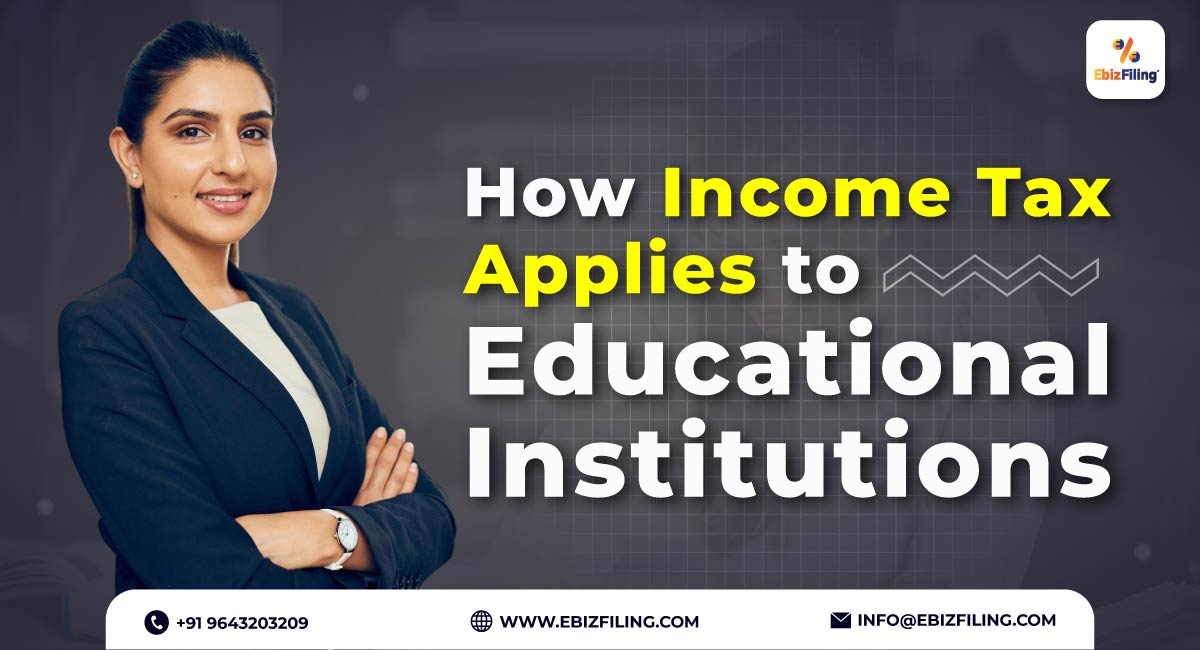
-
November 22, 2025
-
ByDhruvi D
Income Tax on Educational Institutions in India – Past Seven Years
Introduction
Educational institutions in India enjoy certain tax exemptions under the Income Tax Act, 1961, especially when they operate for charitable or not-for-profit purposes. However, not all institutions are fully exempt — taxation depends on registration status, source of income, and compliance with prescribed conditions. Over the past seven years, Finance Acts and CBDT circulars have clarified how schools, colleges, and universities are taxed.
In this article, we provide a year-wise overview of the income tax on educational institutions from FY 2018–19 to FY 2025–26, along with insights on surcharge, cess, and GST applicability.
Year-Wise Income Tax Treatment for Educational Institutions
|
Financial Year |
Assessment Year |
Exemption Status |
Applicable Tax Rate (if taxable) |
Surcharge |
Health & Education Cess |
Effective Tax Burden |
|
2018–19 |
AY 2019–20 |
Exempt under Sec. 10(23C)/12AA |
30% (if corporate form) / slab (if trust) |
7%, 12% |
4% (introduced) |
26% – 34.94% |
|
2019–20 |
AY 2020–21 |
Same provisions |
Same as above |
7%, 12% |
4% |
26% – 34.94% |
|
2020–21 |
AY 2021–22 |
12AA registration replaced by 12AB |
Same as above |
7%, 12% |
4% |
26% – 34.94% |
|
2021–22 |
AY 2022–23 |
Continued 12AB regime |
Same as above |
7%, 12% |
4% |
26% – 34.94% |
|
2022–23 |
AY 2023–24 |
Re-registration under 12AB mandatory |
Same as above |
7%, 12% |
4% |
26% – 34.94% |
|
2023–24 |
AY 2024–25 |
Same as above |
Same as above |
7%, 12% |
4% |
26% – 34.94% |
|
2024–25 |
AY 2025–26 |
Same as above |
Same as above |
7%, 12% |
4% |
26% – 34.94% |
Source: Finance Acts (2018–2025), Income Tax Department- incometax.gov.in
Key Insights on Taxation for Educational Institutions
1. Charitable Exemption under Income Tax Act
-
Institutions existing solely for education (and not for profit) can claim exemption under Section 10(23C) or Section 12AB.
-
If the institution earns surplus, it must be applied to educational purposes to retain exemption.
2. Transition from 12AA to 12AB
-
From AY 2021–22, registration of charitable institutions shifted from Section 12AA to Section 12AB.
-
Institutions had to re-register to continue availing exemption.
3. Income Tax for Non-Exempt Institutions
If exemption is not available, taxation applies:
-
Trust/NGO model: taxed at slab rates.
-
Company model: taxed at 30% corporate rate plus surcharge & cess.
4. GST for Educational Institutions
-
Exempt: Core education (schools, recognized colleges, approved universities).
-
Taxable: Private coaching centers, training institutes, canteens, transportation, and commercial courses attract GST @ 18%.
-
This distinction between exempt and taxable services is critical for compliance.
5. Effective Tax Burden
-
For exempt institutions, tax liability is zero if compliance is maintained.
-
For taxable institutions (non-exempt), effective tax rates range between 26% and 34.94%, similar to domestic companies.
Conclusion
Over the past seven years, the income tax on educational institutions has remained stable, with the most significant change being the shift to 12AB registration from AY 2021–22. While most genuine educational institutions enjoy exemption, those operating commercially or failing compliance face regular tax liability. At the same time, GST for educational institutions continues to exempt core services but taxes ancillary services at 18%. Careful compliance is necessary to retain exemptions and avoid penalties.
Suggested Read :
Donation Under Section 80G of Income Tax
What is ELSS Under Income Tax Act?
Authenticity of Income Tax Notices
Section 206C of Income Tax Act
FAQs
1. Are all educational institutions exempt from income tax?
No. Only those registered under Section 10(23C) or 12AB and applying income for education qualify for exemption.
2. What is Section 12AB for educational institutions?
It is the re-registration regime introduced from AY 2021–22 for charitable and educational institutions.
3. Do private coaching centers get exemption?
No. Coaching centers and commercial training institutes are taxable like regular businesses.
4. What happens if an educational institution earns profit?
As long as profits are applied to educational purposes and not distributed, exemption continues.
5. What is the income tax rate for a taxable educational institution?
It is 30% plus surcharge and cess (if registered as a company) or slab rates (if registered as a trust).
6. Is GST applicable to schools and universities?
No, core educational services by recognized institutions are GST-exempt.
7. Which services by educational institutions are subject to GST?
Transport, canteen, placement, coaching, and commercial training attract GST at 18%.
8. Has the tax regime changed in the last seven years?
Yes, the main change was the shift from Section 12AA to 12AB registration from AY 2021–22.
9. What cess applies to educational institutions?
4% Health & Education Cess applies if the institution is taxable.
10. How can EbizFiling help educational institutions?
We assist with 12AB registration, income tax return filing, GST compliance, and advisory for education sector taxation.
Income Tax Returns
File ITR in simple steps with Ebizfiling!
About Ebizfiling -










February 26, 2026 By Dhruvi D
How to Register an LLP in India for NRIs & Foreign Nationals? (2026) Introduction Why Choose an LLP Structure in India? India’s robust economic development, startup ecosystem, and lenient FDI policies continue to draw in international investors. Even for foreign […]
February 26, 2026 By Steffy A
Top 10 CA Firms in India- 2026 updated list Introduction Many Indian businesses suffer tax penalties due to the strict tax deadlines and the many confusing tax laws. As a business owner in India, the best option is to find […]
February 26, 2026 By Steffy A
Logistics Accounting Guide 2026: Best Practices for US Businesses Introduction For any US business operating in logistics, strong logistics accounting is no longer optional. It keeps your cash flow steady, your costs under control, and your profits protected. […]